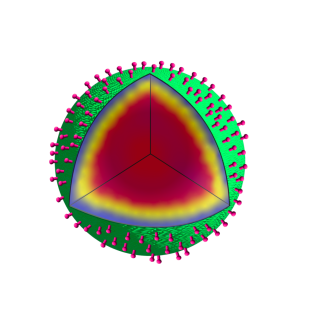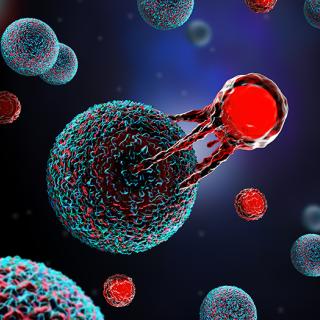Our Discoveries
First clinical trial testing a prevention for breast cancer metastasis to the brain yields encouraging results
When breast cancer metastasizes to the brain, new tumors usually develop even after treatment. But recurrence was low among women who received low-dose temozolomide with T-DM1 in a phase I clinical trial.
Read MoreResearchers create a novel cancer drug delivery system inspired by bacterial spores
CCR researchers, led by Senior Investigator Kumaran S. Ramamurthi, Ph.D., have found a way to deliver drugs directly to cancerous tissue — at least in an animal model — by copying the structure of bacterial spores. Their synthetic, spore-like particles are a novel approach to avoiding the harmful systemic side effects of chemotherapy.
Read MoreResearchers uncover stable molecular networks inside liver tumors
The ever-changing nature of tumor microenvironments makes treating cancerous tumors difficult. CCR researchers, led by Xin Wei Wang, Ph.D., Deputy Chief of the Laboratory of Human Carcinogenesis, have performed single-cell RNA sequencing analyses on samples from 44 liver cancer patients. They have uncovered stable molecular networks that cells within liver tumors use to speak with nearby immune cells, which could open a path for therapeutic exploration for liver cancer.
Read MoreDrug Combination Shows Promise for Rhabdomyosarcoma, but Can It Get to Clinical Trials?
A study led by Marielle E. Yohe, M.D., Ph.D., Lasker Clinical Research Scholar in the Laboratory of Cell and Developmental Signaling, and Javed Khan, M.D., Deputy Chief and Senior Investigator in the Genetics Branch, has identified a potential new treatment for children with rhabdomyosarcoma. The researchers are exploring options and hope to test their drug combination in human clinical trials.
Read MoreWhen chemotherapy interrupts genetic programs critical for neuronal development and activity, cells accrue DNA damage and die
To become neurons, brain cells must damage and immediately repair their own DNA. Some chemotherapies may harm neurons by interfering with this process.
Read MoreResearchers exploit novel vulnerability to deprive solid tumors of nutrients
Rapidly dividing cancer cells in solid tumors can outgrow their supply of nutrients. New research suggests that tumor support cells produce collagen-derived glutamine as a source of energy for nutrient-deprived tumors. This work reveals a novel approach for designing anti-cancer drugs that can starve solid tumors.
Read MoreNew insights into why smoking causes fatty liver disease
A new study using nicotine-metabolizing bacteria sheds light on the cellular processes triggered by tobacco use and helps explain why smoking can lead to non-alcoholic fatty liver disease. Tobacco cessation is the best way to reduce the harmful effects of smoking. These findings could help researchers develop additional approaches to address smoking-related liver damage.
Read MoreT-cell imbalance can impact immunotherapy outcomes
The rapid growth of a patient’s cancer following immune checkpoint inhibitor therapy, known as hyperprogressive disease, is an unexpected treatment outcome that is challenging to predict or study. New results show that a T-cell imbalance in the tumor microenvironment can trigger the condition.
Read MoreMapping cells’ mechanical properties for insight into metastasis
A new approach allows researchers to investigate cells’ mechanical properties in tissue-like environments.
Read MoreLiver cancer may unexpectedly be influenced by platelets
Platelets have long been associated with more aggressive cancers; however, new results show that these cell fragments release molecules with anti-tumor properties against liver cancer, reducing tumor burden in mice. The results provide detailed insights into the mysterious role of platelets in cancer progression.
Read More







